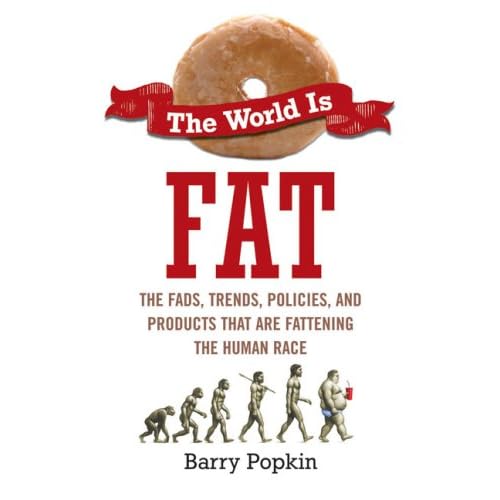 The title: The World is Fat
The title: The World is FatThe author: Barry Popkin
Publication: Penguin, 2009
Got it from: Library
The world has changed so much in the past fifty years, writes Barry Popkin, that there are now more overweight and obese people in the world than undernourished.
That is the premise of this interesting look at the history and politics of why we weigh what we do. I found it particularly fascinating when he outlined our dietary habits through history, from prehistoric times to his own childhood in the 1950's. It's incredible to think that just fifty years ago, fast food restaurants did not have the stranglehold they have today and that up until the 20th century, what we ate didn't vary all that much from our early agricultural days. It's only in the past fifty years that we've become obese (even less in the developing world). This book looks at the changes that have brought us here:
-A decrease in overall physical activity. The advent of time-saving appliances and farm equipment, as well as cars, has decreased our activity levels dramatically. Although it may not seem like much, the author shows how something as simple as washing dishes by hand adds up in terms of calories over a lifetime.
-An increase in portion sizes and the amount of sugar, fat and calories in the average meal, not to mention the increase in snacking.
-A major push by the food industry toward advertising junk food and value menus in fast food restaurants
- Junk and fast food being cheaper than healthy food
What's interesting about this book is that it chronicles not just the US but other countries as well. Mexico in particular is being hit hard. In less than twenty years, they went from a relatively healthy nation to the second highest obesity rate in the world. In poor countries it's not just a matter of eating right to lose weight. Most people don't have the money to pay for expensive fruits and vegetables. They drink pop because their water is contaminated and it's the only cheap option around. They don't have the information on diet and exercise that we have access to. Etc etc etc. Fifty years ago, only the rich could afford to be fat. Now it's exactly the opposite. The richer you are, the more likely you are to be thin and vice versa.
I know I don't always eat as well as I should, but I was shocked-SHOCKED-when he described typical lifestyles of some of these overweight families. Tacos and Coke for breakfast every day? Absolutely no activity at all for anyone? Have things changed that much since I was a kid, or was my family just a bunch of freaks? I wasn't the most active of kids, but my sister and I would spend a lot of time playing outside because it was fun. We'd always eat at home, except maybe Friday nights. And our cereals and juices may have been sugary but at least they were breakfast foods for heaven's sake. We had gym class and recess to burn off our excess energy. Nowadays, apparently, kids just text each other on the playground.
I actually wish this book had been longer in some areas, because I found it very absorbing. In particular, I was hoping he would discuss the social effects of eating. So much of my happiest memories growing up involved food because that's what my life revolved around. My family would eat out on Friday nights and that was special. If a friend had a birthday, we'd have cake and ice cream or popcorn at the movies. If my family went on a Sunday outing, we'd often end up having a doughnut at Tim Horton's. While these weren't everyday occurrences, they definitely imprinted on my mind that fun times=unhealthy food. I think that was the case for a lot of people of my generation, who don't have as good a time unless there's a treat in it somewhere. Eating healthy at a sleepover or when going out with friends would have been unthinkable.
I definitely recommend this book. It will make you think twice about what you're eating and why your body isn't built to handle all the sugar and fat you put into it.
1 comment:
When I was a kid, we went out to eat on Friday nights, too.
Nowadays I guess a lot of people eat fast food everyday.
I think it's sad that so much of socialization centers around food. People want to reunite. Ok, where? A restaurant. I mean, I can just sit and talk to a person. I don't need food. Maybe it's a cultural thing, too. I have a (new)Hispanic friend who seems to center all of our get-togethers around food. She's already worried about what she'll serve when I go to her new house. I mean, puhleeze.
Donna
Post a Comment